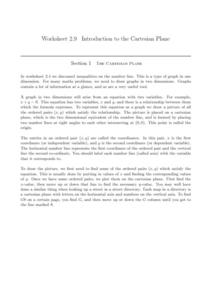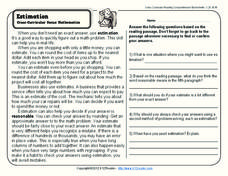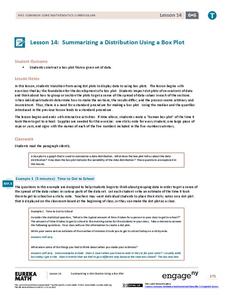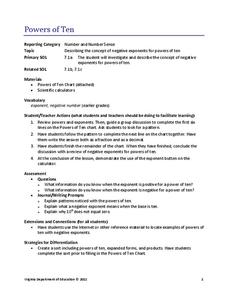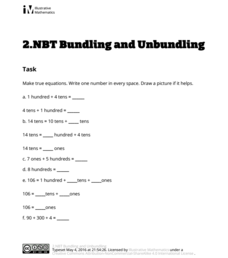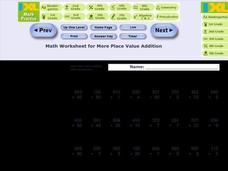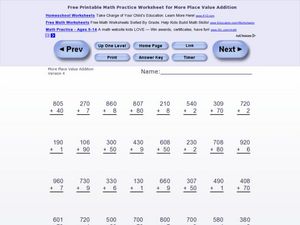Curated OER
Confusing Fractions and Decimals
Eight number lines are given, and math scholars need to place the given decimal numbers on the fraction line as accurately as possible. Each number line shows a different span of numbers. Consider having learners go through it the first...
Curated OER
Hundreds question
In this hundreds online activity, students answer the question for how many hundreds are in the given number.
Curated OER
Multiplying Decimals by 0.001 (A)
In this mathematics worksheet, 4th graders solve a number of problems by multiplying decimals by 0.001 for each. There are 45 problems to solve on the sheet.
Curated OER
Dividing Decimals by Powers of Ten (A)
Upper elementary and middle school learners solve a number of problems by dividing decimals by powers of ten. There are 45 problems to solve on the sheet.
Curated OER
Base Ten Blocks Rods and Flats (A)
Using visual cues and hands on manipulatives are great for conveying concepts in a concrete way. Learners are given a set of rods, they break the set up into flats, then count the rods left over to determine an answer. There are 5...
Illustrative Mathematics
Listing Fractions in Increasing Size
Increase the depth of your class's fractional number sense with this number-ordering activity. Given four fractions, each with different numerators and denominators, young learners are asked to place them in order from smallest to...
Curated OER
The Cartesian Plane
Learners solve and complete 22 various types of problems. First, they find the gradients of the lines and plot the given points. Then, they complete the table of values for each equation and use the table to draw the graph.
Charleston School District
Comparing and Ordering Irrational Numbers on a Number Line
Estimating the value of numbers is much harder than it sounds! Scholars compare and order the value of numbers presented in different forms including fractions, decimals, roots, integers, and pi. This builds on the previous lessons in...
EngageNY
Find Solutions to Make Equations True
The truth is always best. Individuals continue to find values that make equations true in the 26th installment of the 36-part module. The only difference is that they now call them solutions to those equations.
K12 Reader
Estimation
When is it a good idea to use estimation? Learn about estimation and rounding with a reading comprehension lesson. After kids read a passage about estimation, they answer five comprehension questions on the other side of the page.
Virginia Department of Education
Equations of Lines
Scholars connect slope-intercept form and standard form to the values of m and b by first matching a set of cards that have slope-intercept form, standard form, values of m, values of b, and graphs of linear equations. They then play a...
EngageNY
Summarizing a Distribution Using a Box Plot
Place the data in a box. Pupils experiment with placing dividers within a data set and discover a need for a systematic method to group the data. The 14th lesson in a series of 22 outlines the procedure for making a box plot based upon...
EngageNY
Writing and Evaluating Expressions—Multiplication and Addition
How many people can sit around a table? The 22nd part in a series of 36 continues the work on writing and evaluating expressions to include expressions with two operations. Pupils use models to determine an expression for the number of...
Curated OER
Sunrise, Sunset
What locations on Earth get the longest number of hours of daylight in the summer? Hint: It's not the equator! Use real-world sunrise and sunset data to develop trigonometric models that can be used to estimate the number of hours of...
Virginia Department of Education
Powers of Ten
Investigate negative exponents of-ten. Pupils use the pattern of increasing powers of 10 to determine negative powers of 10. The scholars write the powers in expanded and product forms and make the connection to exponents using a...
Balanced Assessment
Fractured Subtraction
Can you spare a 10? Scholars determine digits that could complete a two-digit subtraction problem. They must find all possible combinations of digits and provide an explanation for their reasoning.
Illustrative Mathematics
Bundling and Unbundling
Seven tens, plus five ones, equals 75. Five ones, plus seven tens, also equals 75. These are the types of equations learners are asked to make true in a worksheet with 11 unfinished equations.
Illustrative Mathematics
Making 124
How many ways can you make the number 124 using only tens and ones? Use a task that prompts young mathematicians to make 124 in as many ways as possible.
Curated OER
Place Value Addition
In this addition worksheet, 2nd graders focus on adding one digit to a three digit number. Students solve for 40 problems with no regrouping necessary.
Curated OER
More Place Value Addition Version 4
In this addition practice worksheet, students solve 40 problems that require them to add 3-digit numbers to 1 or 2-digit numbers.
Curated OER
More Place Value Addition Version 3
In this addition practice worksheet, students solve 40 problems that require them to add 3-digit numbers to 1 or 2-digit numbers.
Curated OER
Horizontal Three Digit Place Value Addition
In this addition worksheet, 3rd graders focus on adding three different numbers. Students solve for 16 horizontal problems with no regrouping necessary.
Curated OER
Horizontal Four Digit Place Value Addition
In this addition worksheet, 3rd graders focus on adding four different numbers. Students solve for 16 horizontal problems with no regrouping necessary.
Curated OER
Place Value Addition, #2
In this addition facts practice activity, students solve 40 problems that require them to add 2-digit numbers to 1-digit numbers.








